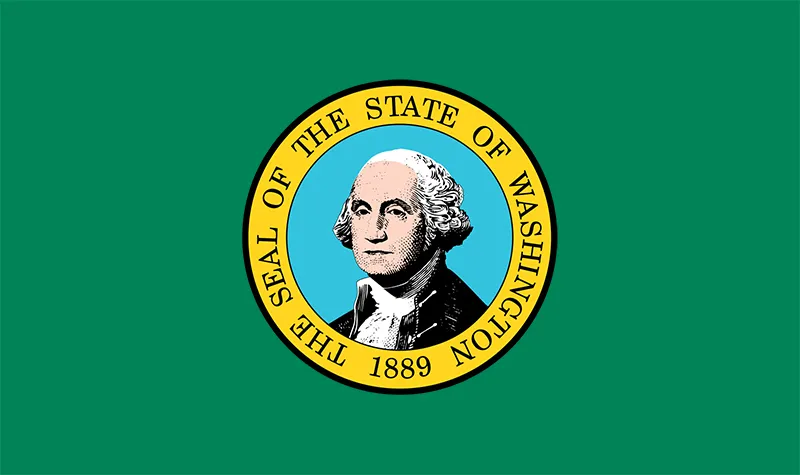Washington State’s security deposit laws are important regulations that landlords and tenants should be familiar with. These laws govern the collection, handling, and return of security deposits in rental agreements, ensuring fairness and protection for both parties involved. Understanding the rights and obligations outlined in the Washington security deposit laws is crucial for landlords and tenants to avoid any legal disputes and ensure a smooth rental experience.
A security deposit is a sum of money that tenants pay to landlords at the beginning of the tenancy. This deposit acts as financial protection for the landlord in case of damage to the rental property or non-payment of rent by the tenant. It provides a sense of security for the landlord and serves as an incentive for tenants to maintain the property in good condition.
Washington State has specific laws in place to regulate security deposits. These laws outline key provisions that landlords must adhere to, such as the maximum amount that can be charged as a security deposit, the timeline for returning the deposit after the lease ends, and the procedures for deducting any damages from the deposit. These regulations ensure fairness and accountability in the landlord-tenant relationship.
In recent years, there have been several changes to Washington security deposit laws, including important updates for 2024. Staying informed about these changes is crucial for both landlords and tenants to ensure compliance with the law and to protect their rights.
Both landlords and tenants have rights and responsibilities outlined in Washington’s security deposit laws. Landlords have obligations regarding the handling and return of security deposits, including providing written notice about the specific terms of the deposit and conducting a move-out inspection. On the other hand, tenants have rights and remedies they can exercise if they believe their landlord has violated the security deposit laws.
To navigate the complexities of security deposit regulations in Washington, it is essential to follow some tips. These tips include documenting the condition of the rental unit before moving in, communicating in writing with the landlord regarding any issues or concerns, and understanding the specific rules and procedures outlined in the Washington security deposit laws.
By understanding and adhering to Washington State’s security deposit laws, landlords and tenants can ensure a fair and transparent rental experience while protecting their rights and financial interests.
Key Takeaways:
- Increased tenant protection: Recent changes in Washington security deposit laws provide added safeguards for tenants, including stricter regulations on deposit deductions and documented property condition assessments.
- Importance of clear documentation: Landlords and tenants should carefully document the property’s condition at the beginning and end of the lease to avoid disputes over deposit returns. Both parties should keep copies of the documentation as evidence.
- Transitional provisions for existing leases: The updated Washington security deposit laws include provisions for existing leases to allow a transition period for landlords to comply with new requirements, ensuring fairness for both tenants and landlords.

Understanding Washington Security Deposit Laws
Understanding Washington Security Deposit Laws is crucial for both landlords and tenants. It is important to consider the following key points:
- Deposit limit: In accordance with Washington security deposit laws, landlords can charge a maximum of one month’s rent as a security deposit.
- Deposit return: Within 21 days of the tenant’s move-out, landlords are required to return the deposit, after deducting any applicable amounts for damages or unpaid rent.
- Itemized deductions: Landlords must provide tenants with an itemized statement that clearly outlines any deductions made from the security deposit.
- Written notice: It is mandatory for landlords to provide written notice to tenants within 14 days if they intend to make deductions from the security deposit.
- Interest payments: Washington does not mandate landlords to pay interest on security deposits.
Understanding these laws is vital as it safeguards the rights of both landlords and tenants, fostering a fair and transparent rental process.
What is a Security Deposit?
A security deposit is a sum of money that a tenant pays to the landlord before moving into a rental property. Its purpose is to provide financial protection to the landlord in case the tenant causes any damage to the property or fails to meet the terms of the lease agreement. The deposit can also be used to cover any unpaid rent or utility bills. It is typically refundable at the end of the lease term, as long as the tenant leaves the property in good condition. The amount of the security deposit is usually equal to one or two months’ rent.
Overview of Washington Security Deposit Laws
When it comes to Washington security deposit laws in 2024, there are some noteworthy changes to be aware of. In this overview, we’ll dive into the key provisions that landlords and tenants need to know. From updated regulations to important rights and responsibilities, this section will provide a comprehensive introduction to Washington’s security deposit laws. Stay informed and stay ahead in navigating the landlord-tenant landscape.
Key Provisions of Washington Security Deposit Laws
Key provisions of Washington security deposit laws incorporate limits on the amount landlords can charge, requirements for providing receipts and itemized lists of damages, and deadlines for returning deposits. Landlords are allowed to charge a maximum of one month’s rent as a security deposit. They must provide a written receipt and a move-in inspection checklist within 14 days of receiving the deposit. When the tenant moves out, the landlord has 21 days to return the deposit, along with an itemized list of any deductions. Failure to comply with these provisions can result in penalties for landlords. Pro-tip: Always thoroughly document the condition of the property before moving in and keep a copy for your records.
Recent Changes in Washington Security Deposit Laws
Recent changes in Washington’s security deposit laws have brought forth important updates for 2024. Discover the latest regulations that tenants and landlords need to be aware of to navigate the rental landscape successfully. Gain insights into the specific changes implemented and how they impact both parties involved. Stay informed and stay ahead when it comes to Washington’s security deposit laws for a seamless rental experience.
Important Updates for 2024
In 2024, important updates for the Washington security deposit laws have been implemented to ensure landlords and tenants are well-informed. These updates are designed to offer additional protections and provide clarity on existing regulations. Notable changes include:
| 1. A transition period has been established for existing leases to comply with the new requirements, allowing both parties time to adjust accordingly. |
|---|
| 2. The importance of written documentation for deposit details has been emphasized to safeguard tenants’ interests. |
| 3. The use of a renter screening service has been recommended to ensure a fair evaluation process. |
These updates are aimed at ensuring that both landlords and tenants are aware of their rights and responsibilities and promote a transparent and equitable approach to handling security deposits. It is advisable to stay updated on the latest rental laws and consult legal resources for any specific questions or concerns.
Rights and Responsibilities of Landlords and Tenants
Discover the ins and outs of being a landlord or tenant in Washington! In this section, we’ll explore the rights and responsibilities that both parties have when it comes to security deposits. From understanding the obligations landlords have regarding security deposits to discovering the rights and remedies available to tenants, we’ll uncover the essential information you need to navigate the world of Washington security deposit laws. Get ready to be empowered with knowledge and ensure a smooth landlord-tenant relationship.
Landlord’s Obligations Regarding Security Deposits
Landlords in Washington have specific obligations when it comes to security deposits. These obligations pertain to the landlord’s obligations regarding security deposits. They must adhere to a set of guidelines to ensure a fair and transparent process. Firstly, landlords must provide tenants with a written checklist of the property’s condition upon move-in. Additionally, it is crucial for landlords to refrain from charging non-refundable fees on top of the security deposit. They are required to place the deposit in a trust account and inform the tenant about the bank’s name and address. As per the regulations, landlords must return the deposit within 21 days after the tenant moves out, or if deductions are made, they need to provide a written explanation for the deductions. Furthermore, landlords should be prepared to provide receipts for deducted amounts and evidence of damages, in case the tenant requests it. In situations where the property has at least six units and is subject to rent control, landlords are expected to pay interest on the deposit. It is vital for landlords to comply with these obligations to avoid legal disputes and protect the rights of their tenants.
Tenant’s Rights and Remedies
Tenant’s Rights and Remedies in Washington State are protected by the Washington Security Deposit Laws. It is vital for tenants to understand that they have the right to receive a written receipt specifying the deposit amount and the conditions for its return. Additionally, tenants are entitled to receive a refund of their deposit within 21 days after moving out, minus any valid deductions. In cases where the landlord fails to refund the deposit or deducts an improper amount, tenants have the option to pursue legal action, such as filing a lawsuit, to recover their deposit. Therefore, it is crucial for tenants to familiarize themselves with these rights and take the necessary steps to safeguard their deposit.
Tips for Handling Security Deposits in Washington
When it comes to handling security deposits in Washington, there are some key tips you need to know. From documenting property condition to understanding deposit dispositions and deductions, it’s important to navigate the process smoothly. We’ll also tackle the common question of distinguishing between ordinary wear and tear versus damage. Get ready to master the ins and outs of Washington’s security deposit laws in 2024 with these helpful insights.
Documenting Property Condition
When it comes to documenting the condition of a rental property, it is vital to follow a few important steps. First and foremost, inspect the property thoroughly before moving in, taking note of any existing damage or issues. It is recommended to take clear and detailed photographs or videos of each room, capturing any existing damage. Additionally, create a written checklist that outlines the property’s condition, specifically noting any pre-existing damage or cosmetic issues. Once you have compiled all the necessary documentation, including photographs, videos, and the written checklist, make sure to keep them in a secure place.
By meticulously documenting the property’s condition, you can safeguard yourself as a tenant and ensure that you will not be held accountable for any pre-existing damage. Furthermore, it is always a prudent idea to share your comprehensive documentation with your landlord or property manager to avoid any potential disputes in the future.
Deposit Dispositions and Deductions
When it comes to deposit dispositions and deductions, landlords must follow specific guidelines outlined in Washington security deposit laws. Here is an overview of the key provisions:
| Action | Landlord’s Responsibilities |
|---|---|
| Document property condition | Before and after the tenancy, landlords must conduct inspections and create a thorough report detailing the property’s condition. |
| Ordinary wear and tear | Landlords cannot deduct from the security deposit for ordinary wear and tear, which is the natural deterioration that occurs from normal daily use. |
| Damage assessment | If there is damage beyond ordinary wear and tear, landlords can deduct a reasonable amount from the security deposit to cover the repair costs. |
| Deposit disposition statement | Within twenty-one days of the tenant moving out, landlords must provide a written statement outlining the disposition of the deposit, including any deductions made. |
| Return of deposit | The remaining deposit, after deductions, must be returned to the tenant within twenty-one days of their move-out date. |
Landlords should familiarize themselves with these regulations to ensure they are in compliance with Washington state law regarding deposit dispositions and deductions.
Ordinary Wear and Tear vs. Damage
Knowing the difference between ordinary wear and tear and damage is crucial when dealing with security deposits in Washington State.
- Ordinary wear and tear refers to the natural deterioration of a property from normal, everyday use. It includes minor scuffs on walls, faded paint, and worn carpet from regular foot traffic.
- Damage, on the other hand, refers to any excessive deterioration or destruction caused by tenants, such as broken windows, large holes in the walls, or significant stains on the carpet.
Understanding the distinction between ordinary wear and tear and damage is essential for both landlords and tenants to ensure fair and appropriate deductions or return of the security deposit.
Additional Requirements and Added Protections
Get ready to discover the latest updates and additional protections in the realm of Washington security deposit laws for 2024. In this section, we’ll delve into the specific requirements and safeguards that have been introduced to further protect tenants. From a transition period for existing leases to the importance of written documentation in safeguarding tenants, we’ll uncover the measures designed to ensure fair and transparent practices. We’ll explore the use of renter screening services and the role they play in maintaining a secure rental environment. So, let’s dive in and explore these vital updates in Washington’s security deposit laws!
Transition Period for Existing Leases
During the transition period for existing leases in Washington, both landlords and tenants must follow specific steps to ensure compliance with the new security deposit laws. Here are the necessary actions to be taken:
1. Carefully review the terms of the current lease agreement.
2. Effectively inform tenants about the changes imposed by the security deposit laws.
3. Provide tenants with updated documentation and forms pertaining to the modified regulations.
4. Clearly communicate any modifications in deposit amounts or procedures to the tenants.
5. Revise lease renewal agreements to accurately reflect the newly implemented laws.
It is important to note that the transition period allows ample time for landlords and tenants to familiarize themselves with the new security deposit regulations. This facilitates a smoother transition for all parties involved.
Safeguarding Tenants with Written Documentation
Safeguarding Tenants with Written Documentation is of utmost importance when it comes to security deposits. Take note of the key steps to follow:
- Ensure the provision of a comprehensive move-in checklist: Thoroughly document the condition of the property before the tenant’s arrival, including any pre-existing damages.
- Utilize a written lease agreement: Clearly outline the terms and conditions of the rental, explicitly mentioning the security deposit amount.
- Mandate written communication: Encourage tenants to submit maintenance requests and express concerns through written means, establishing a concrete paper trail.
- Maintain records of correspondence: Preserve copies of all written communication exchanged between the landlord and tenant, particularly regarding the property’s condition.
- Create an exhaustive move-out checklist: Conduct a meticulous inspection of the property when the tenant moves out, comparing it to the move-in checklist and making note of any damages.
- Provide a written explanation for deducted amounts: In the event that deductions are made from the security deposit, furnish an itemized list specifying the reasons and corresponding costs.
- Retain copies of all documentation: Safeguard duplicates of the lease agreement, move-in and move-out checklists, as well as any other pertinent written documentation.
Use of Renter Screening Service
Using a renter screening service can provide several benefits for landlords and tenants in Washington. Here are some advantages to consider:
- Enhanced tenant selection: The use of a renter screening service can help landlords identify reliable and responsible tenants by conducting background checks, verifying employment, and checking credit history.
- Reduced rental risks: By utilizing a renter screening service and thoroughly screening potential tenants, landlords can minimize the risk of late rent payments, property damage, and eviction.
- Legal compliance: The use of a renter screening service can assist landlords in ensuring compliance with fair housing laws and avoiding discrimination claims.
- Time and cost savings: By outsourcing the screening process to professionals, landlords can save time and effort in reviewing applications and conducting screenings themselves.
- Peace of mind: Tenants can benefit from the use of a renter screening service, as they will know that their potential neighbors have undergone a screening process, creating a safer living environment.
Legal Disputes and Eviction Process
Legal disputes and the eviction process can be a challenging terrain to navigate when it comes to Washington security deposit laws in 2024. In this section, we’ll dive into the intense world of eviction hearings and whip lists, examining how they can impact tenants and landlords alike. We’ll also explore the possibilities of suing for deposit and the intricate lawsuits surrounding deposit disputes, shedding light on the legal intricacies involved. So, fasten your seatbelts as we unravel the legal drama that unfolds in this realm of Washington state’s security deposit laws.
Eviction Hearings and Whip Lists
To successfully navigate eviction hearings and whip lists in Washington, follow these steps:
- Make sure to attend the eviction hearing on the scheduled date and time.
- Present your case and provide evidence to support your defense against the eviction.
- Be prepared to refute any claims made by the landlord and demonstrate any violations on their part.
- Follow all proper court procedures and adhere to the necessary legal requirements.
- Consider seeking assistance from tenant advocacy organizations or obtaining legal representation.
- Remember to bring any relevant documents, such as lease agreements, communication records, and receipts.
- During the hearing, make sure to take notes and document all important details.
- Understanding the whip list is crucial, as it contains the names of tenants with eviction orders.
- It may be valuable to consult with legal experts to fully comprehend your rights and explore options to challenge the eviction.
- Stay mindful of the deadlines for filing appeals, if they become necessary in your case.
Sue for Deposit and Lawsuits for Deposit Disputes
When dealing with deposit disputes in Washington, it’s crucial to understand the state’s laws and take appropriate action. Here is a comprehensive list of steps to consider when suing for a deposit or navigating deposit-related legal proceedings:
- Gather evidence: Collect any documentation, such as photos, lease agreements, and correspondence, to support your case.
- Review the Residential Landlord-Tenant Act: Familiarize yourself with the relevant laws that govern deposit disputes in Washington.
- Send a demand letter: Communicate your concerns and request the return of your deposit in writing, giving the landlord a chance to resolve the issue without litigation.
- File a lawsuit: If all attempts at resolution fail, consult with an attorney and file a lawsuit against the landlord in a small claims court or district court. This is how you can sue for deposit disputes.
- Attend the court hearing: Prepare your case, present evidence, and articulate your claim during the scheduled court hearing.
- Follow court procedures: Abide by all the court’s instructions and deadlines, submit required documentation, and cooperate fully.
- Seek legal counsel: If the case becomes complex or involves significant amounts, consider hiring an attorney to represent your interests and navigate the legal process effectively. Lawsuits for deposit disputes require proper legal guidance.
Understanding the Residential Landlord-Tenant Act
The Residential Landlord-Tenant Act in Washington State holds valuable insights for renters and landlords alike. From the latest laws affecting renters to the nuances of the Manufactured/Mobile Home Landlord-Tenant Act, we’ll dive into the crucial information you need to know. Get ready to unlock a clearer understanding of tenant rights, legal protections, and the evolving landscape of Washington’s security deposit laws in 2024. Let’s explore the intricacies that shape the relationship between landlords and tenants in the state.
Laws Affecting Renters in Washington State
When renting a property in Washington state, it is crucial for renters to understand the Laws Affecting Renters in Washington State. These laws provide essential protections and outline both landlord and tenant rights and responsibilities. Some key provisions include regulations regarding security deposits, eviction processes, and ordinary wear and tear. It is important for renters to document the property’s condition before moving in and be aware of their rights when it comes to deposit dispositions and deductions. By familiarizing themselves with the residential landlord-tenant act and other laws specific to Washington state, renters can ensure they are well-informed and protected throughout their tenancy.
Manufactured/Mobile Home Landlord-Tenant Act
The Manufactured/Mobile Home Landlord-Tenant Act in Washington State provides regulations and protections for tenants living in manufactured or mobile homes. This act covers aspects such as rental agreements, rent increases, security deposits, maintenance responsibilities, and eviction procedures. It ensures that both landlords and tenants understand their rights and obligations, promoting fair and equitable living conditions. For example, the act stipulates that landlords must provide written rental agreements and properly maintain the premises. Tenants, on the other hand, have the right to a safe and habitable home. By adhering to this act, both parties can avoid disputes and ensure a positive living experience in manufactured or mobile homes.
Fact: The Manufactured/Mobile Home Landlord-Tenant Act was enacted in Washington State to specifically address issues related to renting and living in manufactured or mobile homes.
Resources and References on Washington Security Deposit Laws
When navigating Washington security deposit laws, it’s crucial to have access to reliable resources and references. Here are some valuable sources to help you understand and comply with these regulations:
- The Washington State Legislature website provides the latest information on resources and references for security deposit laws in Washington.
- The Tenants Union of Washington State offers helpful guides and resources for tenants looking to understand their rights regarding security deposits.
- The Washington Landlord Association provides resources and support for landlords, including information on security deposit regulations.
- Your local housing authority can offer guidance and additional resources on Washington security deposit laws specific to your area.
True story: One tenant in Washington, Michael, found himself in a dispute over his security deposit with his landlord. He was able to resolve the issue by referring to resources and references on Washington security deposit laws and presenting his case based on the legal requirements. This highlighted the importance of being well-informed and prepared when dealing with security deposit matters.
Some Facts About Washington Security Deposit Laws: What’s new in 2024:
- ✅ The Washington HB 1074, effective July 23, 2023, introduces changes to a Housing Provider’s ability to withhold security deposit amounts. (Source: Our Team)
- ✅ Under the new law, withholding amounts for ordinary wear and tear is prohibited while imposing additional requirements for providing documentation to support withheld amounts. (Source: Our Team)
- ✅ A checklist or statement of the unit’s condition and cleanliness, including existing damages, must be provided to the renter at the start of the tenancy. The renter can request one free replacement copy of the checklist. (Source: Our Team)
- ✅ The deadline for refunding a security deposit and providing a statement of the basis for retaining any amount is extended to 30 days from the termination of the rental agreement and the renter’s vacation of the unit. (Source: Our Team)
- ✅ Damages for wear without proper documentation cannot be charged to the renter, reported to consumer reporting agencies, or submitted for collection. (Source: Our Team)
Frequently Asked Questions
1. What changes have been made to Washington security deposit laws in 2024?
Effective July 23, 2023, Washington HB 1074 brings changes to a Housing Provider’s ability to withhold security deposit amounts. It prohibits withholding amounts for ordinary wear and tear and imposes additional requirements for providing documentation to support withheld amounts. The law now requires a checklist or statement of the unit’s condition and cleanliness to be provided to the renter at the start of the tenancy. The deadline for refunding a security deposit and providing a statement of the basis for retaining any amount is extended to 30 days from the termination of the rental agreement and the renter’s vacation of the unit.
2. Can a renter request a free replacement copy of the checklist?
Yes, under the updated law, a renter can request one free replacement copy of the checklist or statement of the unit’s condition and cleanliness.
3. What items are considered ordinary wear and tear?
Under the new law, “wear resulting from ordinary use of the premises” is defined as deterioration from intended use, excluding negligence or abuse. This includes normal wear and tear such as light fixtures, wall paint, and carpet cleaning charges unless they go beyond ordinary wear.
4. What documentation is required for damage charges?
Housing Providers must include copies of estimates or invoices to substantiate damage charges. They are also required to provide bills or receipts for materials or supplies used in repairs. Additionally, a statement of the time spent and the reasonable hourly rate charged for repairs performed by themselves or their employees must be provided.
5. Can security deposits exceed the cost of repair or replacement for damages?
No, according to the updated law, security deposits cannot exceed the cost of repair or replacement for damages that do not encompass the entirety of an item.
6. Are there any restrictions on charging renters for normal wear and tear?
Yes, the law prohibits Housing Providers from charging renters for wear resulting from ordinary use, carpet cleaning charges (unless beyond ordinary wear), or costs of repair or replacement if not documented in the checklist or statement of condition and cleanliness provided at the start of the tenancy.
Dave is a seasoned real estate investor with over 12 years of experience in the industry. Specializing in single-family residential real estate, David’s strategic approach combines market analysis, financial acumen, and a deep understanding of urban development trends to maximize investment returns.










